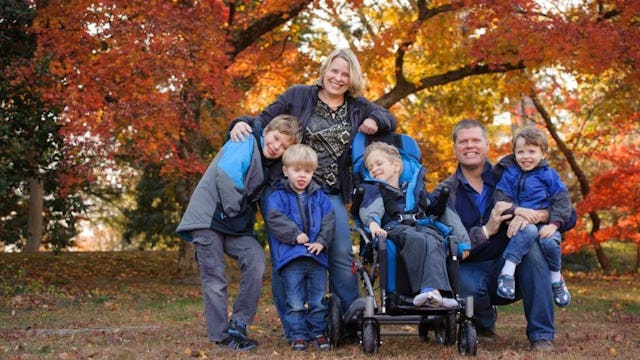Parenting A Child With Severe Disabilities: 'Is There Anybody Out There?'

I am lonely.
Most parents of children with severe disabilities are, actually. When our children are born, there is both celebration and sympathy, offers of help and people who disappear from our lives because they don’t know what to say or do.
In the beginning, our children are often less intimidating. They are easier to lift and their care is more manageable. When our children are young, it’s easier to get a babysitter for a bit of precious time away to regroup.
As our children age, however, help disappears. Friends have their own lives and gravitate toward less-stressed people, people who have more freedom. They have their own challenges; they don’t have the energy to share in ours. They still care, but from a distance. They are frazzled by the thought of managing care for a child with health issues, for a person who may be too heavy for them to lift, or they may be scared to be alone with the child. Lack of help becomes a real and frequent issue for the parents of a child with severe disabilities.
We struggle constantly. However, if you ask us, “We’re fine.” We don’t know what to say when you inquire, “How can I help?” We don’t even know where to begin.
As our children age, the loneliness is pervasive. Often parents are pulled away from each other as they are by necessity shifted in one direction or another to meet family needs. Rare is the quiet time as a couple to check in with each other, to regenerate the bond. Bathroom breaks now qualify as alone time and space, forget trying to coordinate a whole day. Offers of help are few and far between now. We’re mostly on our own in the day-to-day big picture, even when we’re together.
People say you need to make time for yourselves, to take better care of yourselves. They offer up exercise programs, reading suggestions, quitting your job, miracle diets with energy boosts. All of these things are next to impossible with your schedule and without help. You feel even more “less-than” because it seems as if everyone else is getting healthy, getting fit, traveling, having family reunions. You struggle to exist, to survive.
As a parent of a child with severe disabilities, you spend your life “tap dancing,” trying to make it all work and make it all fit. You feel like you fail — every single day. You are never enough. Your time is never enough. Your paperwork is never done. You can never afford all your family’s needs. Your child’s appointments are constant. Your work often comes before your children so you can do your job, prove you are great at your job, so there is never a question when you need to take time off to care for your child. The isolation of it all is suffocating.
Social media becomes your escape — the connection you have to the great big world. On Facebook, someone is always awake when you have insomnia. When your child is sick and you are pulling graveyard hours, you can talk to a friend in another country. There is someone out there who understands, who cares, who sends you thoughts and/or prayers to make it through. There is a connection.
It’s hard not to simply disappear into the life you lead, into the aloneness of it all — even when you are surrounded by people. You try to breathe through it all and stay positive. Stay strong.
You wish you could tell your family and friends: I’m sorry I get stuck in my own small world and forget to ask about yours. You are important too. I need you, and I miss you. I know you wish you could do more. Please don’t ask me what I need; if you want to help, do it. It would mean the world to me. Even your company is enough. I’m still here, and I’m still me.
I’m still here.